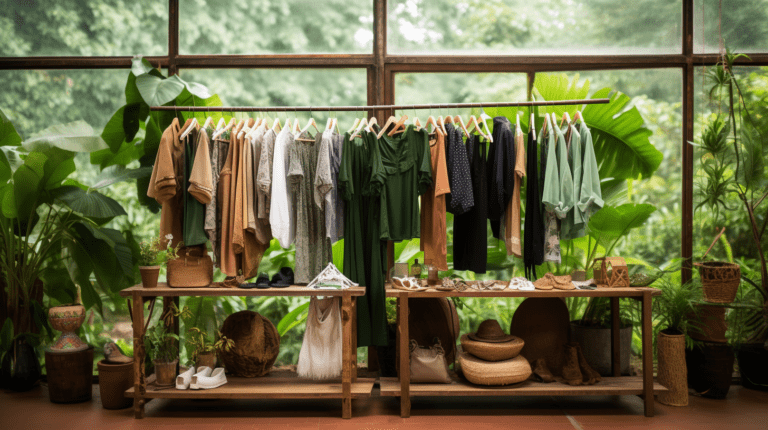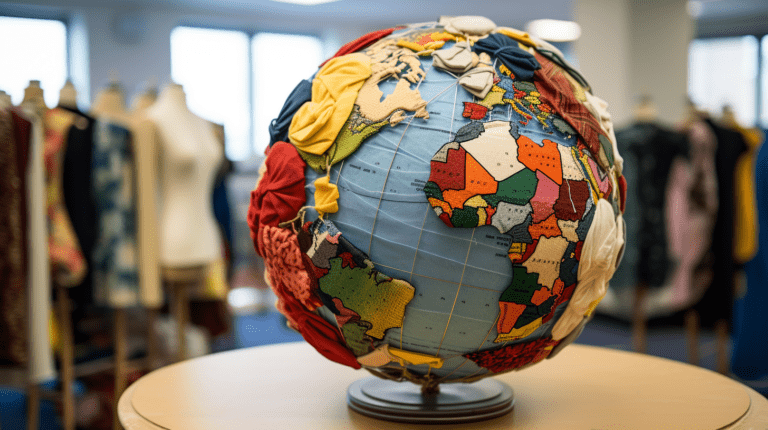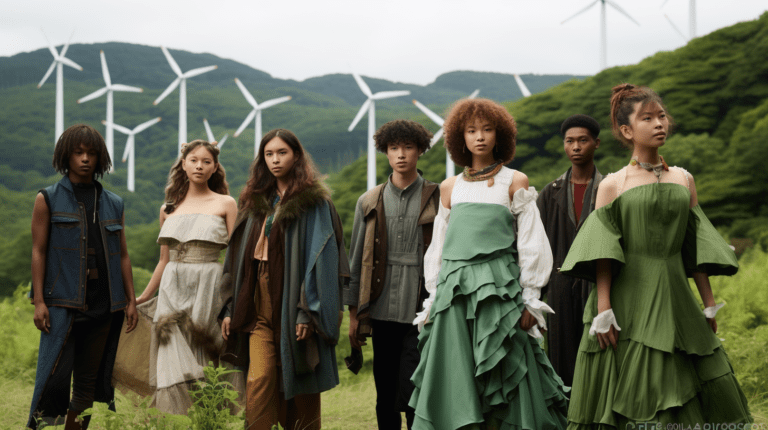Sustainable Fashion Influencers – Imagine if Marie Antoinette, the queen of excess herself, were to swap out her lavish silk gowns for sustainable bamboo dresses. It’s a striking visual, isn’t it? Welcome to the 21st century where modern ‘queens’ are championing just that – a transition from fast fashion to eco-friendly attire.
Sustainable fashion influencers are leading this charge, using their platforms not only to promote ethically-made clothes but also raise awareness about the environmental impact of our wardrobe choices. As you delve into this article, you’ll meet these pioneers and learn how they’re leveraging social media tools to make sustainability trendy.
We’ll explore the challenges they face in promoting green garments amidst an industry notoriously resistant to change. But don’t mistake this for a simplistic crusade – it’s an intricate tapestry woven with politics, economics and creativity. So brace yourself as we unravel the future of sustainable fashion influencing in today’s digital age.
Key Takeaways
- Sustainable fashion influencers promote eco-friendly attire and raise awareness about the environmental impact of fast fashion.
- Sustainable fashion involves supporting brands that value ethical practices and eco-friendly materials.
- Influencers play a critical role in driving eco-conscious consumption patterns and inspire followers to make more sustainable choices.
- Influencers collaborate with ethical brands, use impact measurement methods, and educate followers on recycling clothes and identifying greenwashing tactics.
Understanding Sustainable Fashion
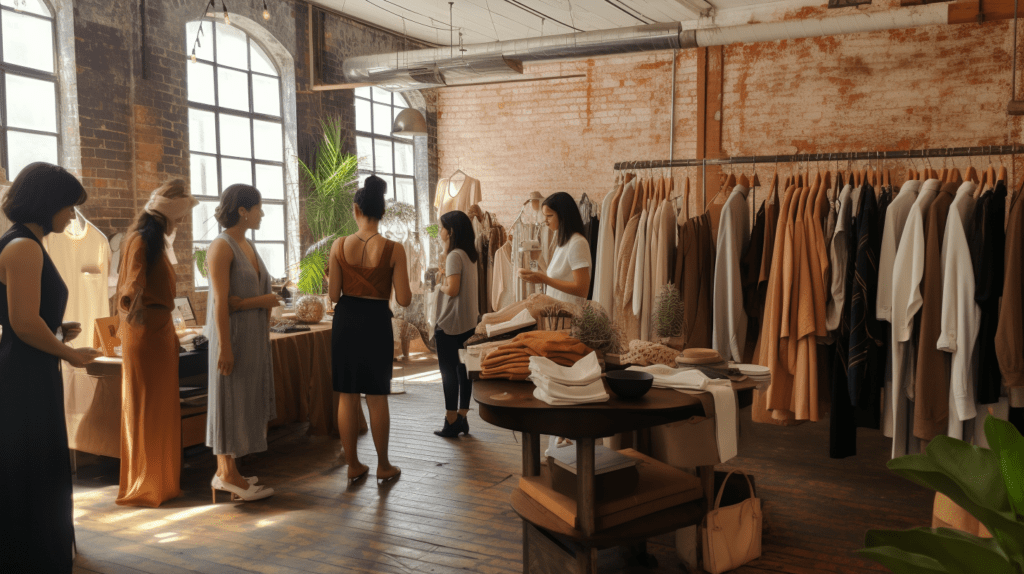
Believe it or not, understanding sustainable fashion isn’t just about buying earth-friendly fabrics; it’s a whole new way of thinking about and interacting with our clothes. It involves making conscious decisions to support brands that value ethical practices and eco-friendly materials in sustainable fashion.
Imagine your wardrobe as an ecosystem. Each piece you wear has had a journey from raw material to the garment hanging on your rack. In traditional ‘fast fashion’, this process is often detrimental to our environment due to the significant waste, pollution, and energy consumption involved. Fast fashion’s environmental impact is far-reaching, affecting water quality, soil health, and climate change.
However, in contrast to fast fashion’s reckless disregard for our planet’s well-being, sustainable fashion takes a 360-degree approach considering all stages – from sourcing raw materials right up until disposal or reuse of garments – ensuring minimal harm to our environment. Eco-friendly materials like organic cotton, hemp, and recycled polyester are widely used in sustainable fashion production. They require less water, fewer chemicals, and help reduce landfill waste.
Moreover, sustainability doesn’t stop at materials; it extends into labor rights as well – pledging fair wages and decent working conditions for those who make our clothes. So when you choose sustainable clothing over fast-fashion alternatives, you’re not only contributing towards preserving Mother Earth but also promoting human dignity.
Now that we’ve demystified what understanding sustainable fashion entails, let’s delve into how pioneers of this movement are influencing the industry by setting new trends while keeping their commitment towards building a healthier planet intact.
Pioneers of Sustainable Fashion Influencing
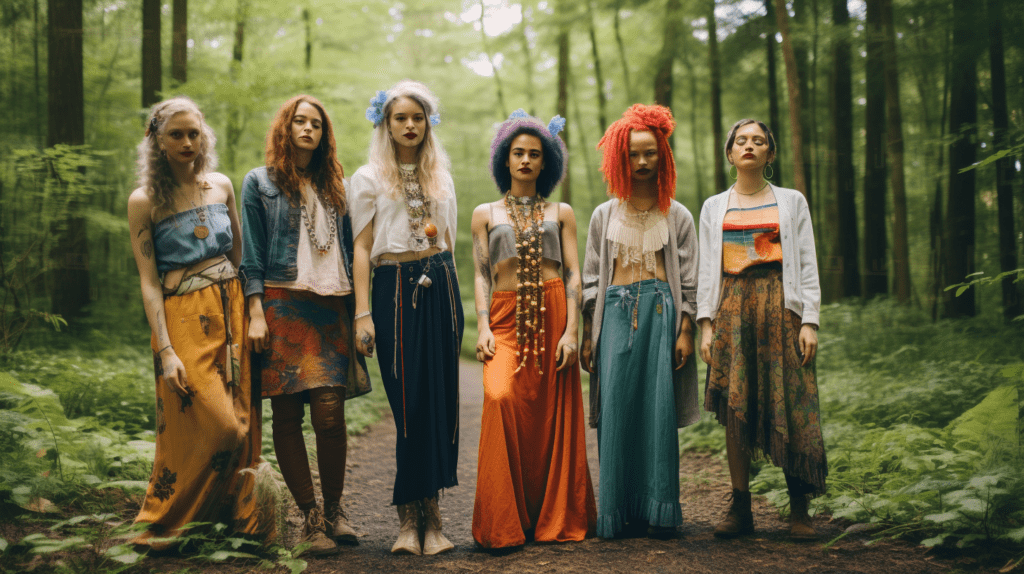
You might not know it yet, but there are trailblazers in the world of couture who’ve made a massive impact without compromising on our planet’s resources. These pioneers of sustainable fashion influencing have taken strides to alter the course of an industry notorious for its harmful environmental impacts and unethical practices. They’ve championed eco-friendly material use, ethical manufacturing practices, and have imbued their followers with a desire for power: the power to make choices that respect both people and planet.
One such pioneer is Stella McCartney, renowned globally for her steadfast commitment to sustainability. She’s revolutionized high-end fashion by refusing to utilize animal products or dangerous chemicals in production. Instead, she opts for innovative materials like recycled polyester and organic cotton, embodying a trend towards eco-friendly material use that many others now strive to emulate.
Similarly, Bruno Pieters has shaken up the industry with his ‘Honest By’ line – a brand that offers unparalleled transparency concerning its supply chain. He empowers consumers with knowledge about where their clothes come from and how they’re made, ensuring ethical manufacturing practices every step of the way.
These luminaries embody a new type of influencer – one who wields their influence not merely for personal gain but also as an agent of transformative change within their industry. Theirs is a powerful voice advocating for sustainable fashion; they challenge us all to reconsider what we wear and why.
So let’s delve deeper into this exciting realm where style meets sustainability. Let’s explore some popular sustainable fashion influencers who continue this pioneering work in our next discussion – inspiring us daily while changing the face of fashion forever.
Popular Sustainable Fashion Influencers
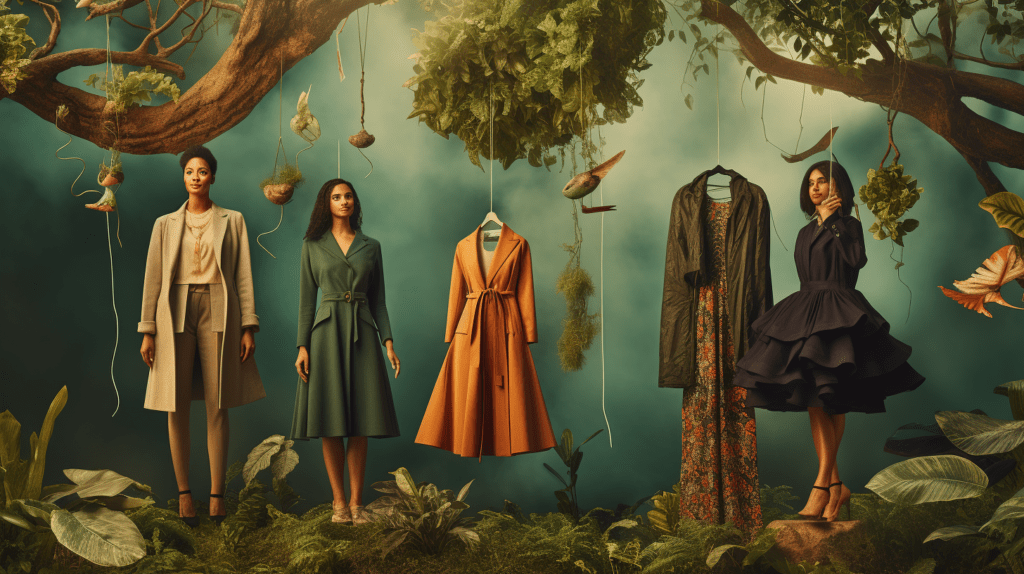
There’s a vibrant community of trailblazers making waves in the eco-couture scene, each with their unique style and approach to greener practices. These popular sustainable fashion influencers are not only helping consumers make more informed choices but are also reshaping the industry itself. They’re harnessing the power of social media to amplify their voices and highlight the importance of sustainability in fashion.
- Emma Watson: Known for her acting, Watson is an influential voice promoting sustainable fashion. Her outfit choices at red carpet events often feature eco-friendly brands, raising awareness about viable alternatives.
- Clare Press: As Vogue Australia’s Sustainability Editor-at-Large and host of ‘Wardrobe Crisis’ podcast, Press champions sustainable fashion through impactful storytelling.
- Levi Hildebrand: YouTube vlogger Hildebrand uses his platform to educate viewers about environmental issues related to fast-fashion.
The influencer’s impact on consumer behavior cannot be underestimated. Their followers take cues from them; hence they play a critical role in driving eco-conscious consumption patterns. The fashion industry’s reaction to these influencers has been mixed – while some brands have embraced sustainability due to growing consumer demand, others remain slow on the uptake.
Navigating this landscape requires careful consideration and understanding that change comes incrementally. Influencers like Watson, Press, and Hildebrand show us that every choice we make can contribute towards a more sustainable future—be it selecting organic cotton or supporting small-scale artisans.
As we delve deeper into how they promote sustainable fashion, keep in mind that this isn’t just about clothes—it’s about reshaping our perspectives and influencing positive change one garment at a time.
How They Promote Sustainable Fashion
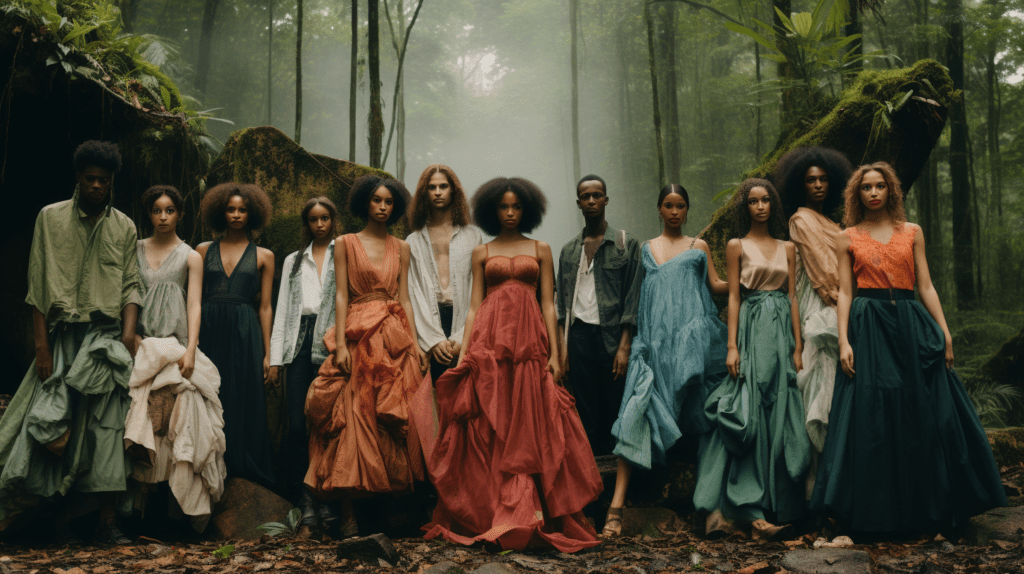
In embracing eco-conscious clothing choices, these trailblazers utilize their platforms to shed light on the importance of responsible consumption and how it impacts our world. They inspire myriad followers to make more informed decisions about what they wear, where it comes from, and its lifecycle once discarded. Such is the power of sustainable fashion influencers who utilize influencer collaboration strategies to amplify their message.
Through series of posts, blogs, or videos, these influencers detail the journey that a piece of clothing makes from raw materials through production until it reaches your wardrobe. They share behind-the-scene stories about ethical brands to show you the human face behind each garment. The aim is not just awareness but action – they encourage followers to buy less but better quality and longer-lasting clothes.
Here’s a quick look at some techniques used:
| Technique | Description |
|---|---|
| Collaboration with Ethical Brands | Influencers often partner with conscious brands for sponsored content or product lines. This gives them first-hand experience about the brand’s practices which they can then honestly share with their audiences. |
| Impact Measurement Methods | These influencers use data-driven methods like carbon footprint calculation and water usage estimation in textile production to provide empirical evidence of why sustainable fashion matters. |
| Educational Content Creation | Through engaging posts and interactive discussions, they educate followers on sustainability topics related to fashion such as recycling old clothes or understanding misleading ‘greenwashing’ tactics by fast-fashion companies. |
These efforts are aimed at changing one closet at a time because every little step counts in this journey towards sustainability. In the next section we’ll delve into how social media plays an indispensable role in amplifying this call for change within the world of fashion without needing any single ‘step’.
The Role of Social Media in Sustainable Fashion Influencing

Social media platforms have become pivotal amplifiers in the call for more eco-conscious clothing choices. Remarkably, a study by Statista revealed that 37% of consumers indicated they were willing to pay extra for an environmentally friendly product if promoted well on social media. This shift towards sustainable fashion is largely influenced by influencers who leverage their digital platforms to advocate for green alternatives while preventing greenwashing.
- Influencer Impact Analysis: Social media influencers are powerful agents of change in the fashion industry. Their ability to sway millions of followers can drive demand towards sustainable brands and promote conscious consumption.
- Greenwashing Prevention Strategies: Influencers educate their followers about deceptive marketing tactics used by some companies claiming sustainability but failing to deliver it genuinely. They help discern genuine sustainability from mere buzzwords, ensuring their audience make informed decisions.
- Sustainable Fashion Advocacy: Through creative content, influencers inspire their followers to embrace second-hand shopping, mending clothes instead of discarding them, and choosing quality over quantity.
Each influencer’s role is multifaceted; they are educators, advocates, and watchdogs simultaneously in the realm of sustainable fashion. They wield power with responsibility as they shape consumer behavior and spur systemic changes within the industry.
While these positive strides exist due to social media’s impact on sustainable fashion influencing, it’s worth noting that there are still considerable challenges lurking behind the scene. These hurdles range from finding authentic sustainable brands amid a sea of greenwashing pretenders to maintaining credibility amidst heightened skepticism among consumers in this era where misinformation runs rampant online – issues which we will delve into further in our subsequent section about ‘challenges faced by sustainable fashion influencers.’ These influencers need to strategically navigate and meticulously evaluate the authenticity of brands while also educating their followers about the nuances of sustainable fashion.
Challenges Faced by Sustainable Fashion Influencers
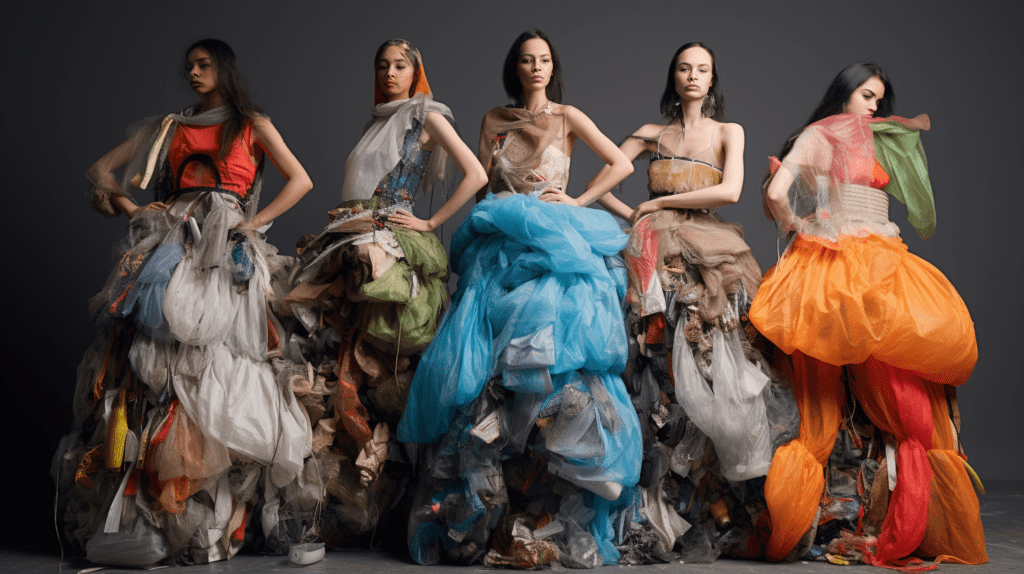
Despite the glitz and glamour, it’s not all smooth sailing for those championing eco-conscious clothing choices on social media platforms. They encounter several challenges in their efforts to promote sustainable fashion.
One of the primary hurdles is dealing with ethical dilemmas. As influencers, they’re often approached by various brands wanting them to endorse their products. However, these offers can pose a dilemma if the brand doesn’t align with sustainable practices. You see, influencers must maintain a balance between promoting brands that support their cause and ensuring they don’t compromise their authenticity.
Influencer authenticity is crucial in this field. Followers need to trust that an influencer genuinely supports sustainability and isn’t just using it as a trend or marketing tool. This trust becomes jeopardized when influencers collaborate with brands that aren’t truly sustainable or when they over-consume even from ethical brands—thus contradicting the very essence of sustainability.
Moreover, there’s also the challenge of spreading awareness without overwhelming or guilt-tripping followers into making changes. Sustainable fashion influencers have to constantly educate themselves about complex issues like fast-fashion consequences, supply chains transparency, textile waste management etc., so they can communicate this knowledge effectively without sounding preachy or judgmental.
As we proceed forward towards exploring ‘the future of sustainable fashion influencing’, let’s remember that despite these challenges; influencers persistently strive for change in the industry—driven by conviction rather than convenience—and continue inspiring us all towards more responsible consumption patterns.
The Future of Sustainable Fashion Influencing
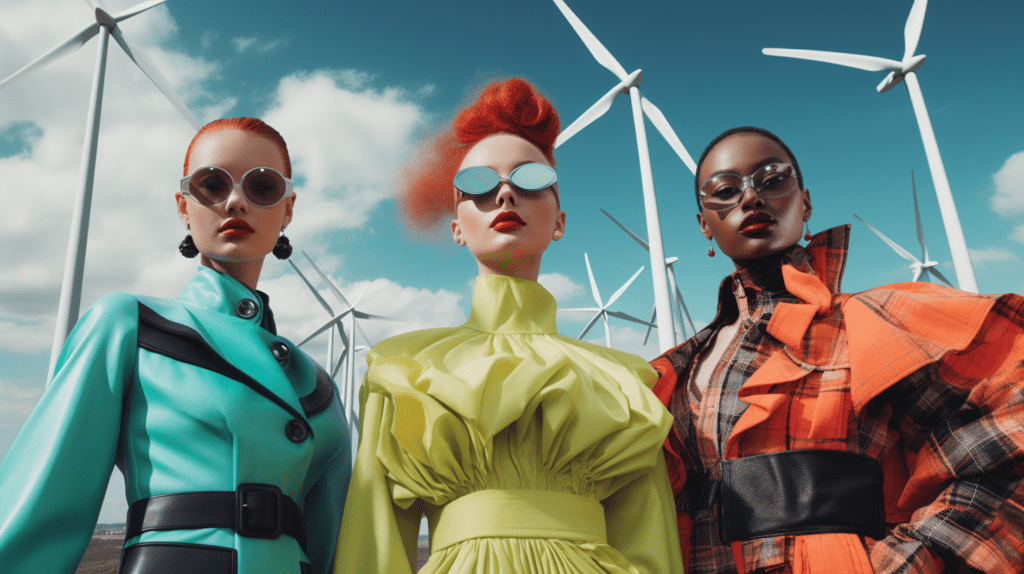
Looking ahead, you might wonder what’s in store for these eco-conscious advocates on social media platforms. The future of sustainable fashion influencing is promising yet fraught with challenges. Influencer accountability and Greenwashing effects are the two critical aspects shaping this future.
Influencer accountability refers to the responsibility influencers have in promoting authentic sustainable brands. Moving forward, they must be more discerning in their partnerships, ensuring every brand they endorse genuinely practices sustainability. This will involve thorough research and fact-checking before taking on any collaboration.
| Challenges | Possible Solutions |
|---|---|
| Greenwashing effects | Promote transparency and call out greenwashing |
| Lack of influencer accountability | Self-regulation, due diligence, and stricter guidelines |
Greenwashing effects pose another significant challenge. Brands often make misleading claims about their products being ‘eco-friendly’ or ‘sustainable’ when they’re not truly so – a practice known as greenwashing. It’s a deceptive marketing ploy that can mislead consumers into thinking they’re making environmentally friendly choices when they aren’t actually doing so.
As an influencer striving for sustainability, it’s crucial to stay vigilant against such practices by promoting transparency and calling out greenwashing whenever detected.
No doubt the path ahead is challenging but remember that your influence wields power—power to shape consumer behavior, drive demand towards genuine sustainable brands, and ultimately contribute to a greener planet. However tough it gets; your role as a sustainable fashion influencer is vital now more than ever before. You hold the key to unlocking a better future through responsible influencing.
Frequently Asked Questions
What qualifications do sustainable fashion influencers typically have?
Typically, there’s no specific educational background required to be a sustainable fashion influencer. However, possessing a degree in Fashion, Marketing, or Sustainability can prove beneficial.
Also, having relevant industry experience in fashion and sustainability helps in understanding the intricacies involved. You need to be well-versed with the latest sustainable practices and have an eye for aesthetics.
Ultimately, your credibility is built on thorough research, fact-checking, and presenting balanced opinions about the sustainable fashion industry.
How can someone become a sustainable fashion influencer themselves?
To become a sustainable fashion influencer, first, understand ethical branding strategies.
Create content that educates and inspires others towards greener choices.
Transition your wardrobe to eco-friendly alternatives and showcase this journey on your platform.
Network with like-minded individuals and brands within the industry.
Constantly research new trends in sustainability to stay informed.
Remember, it’s not just about powerful aesthetics but also making impactful changes in the fashion industry through your influence.
Does sustainable fashion influencing provide a reliable income?
Just as the mythical Midas turned everything to gold, your income stability in sustainable fashion influencing can be uncertain.
Your revenue sources aren’t always predictable – collaborations, sponsored content, and affiliate marketing often fluctuate.
However, with a loyal community supporting eco-conscious choices and comprehensive knowledge of this burgeoning industry, you might find a decent income waiting.
Remember though, it’s vital to balance earnings with genuineness; only then can you achieve true influence and financial success.
How do sustainable fashion influencers measure the success of their campaigns?
You measure the success of your campaigns by evaluating the Brand Collaboration Impact and the effectiveness of Sustainable Product Promotion.
Check for increased brand awareness, engagement rates, sales, or conversions linked to your advocacy.
Analyze feedback from followers, their participation in sustainable practices, and changes in their shopping habits.
Remember, success isn’t just about numbers – it’s about making a real impact toward sustainability in fashion.
Thorough research and fact-checking ensure you’re on top of trends while maintaining an unbiased stance.
What are some common misconceptions about sustainable fashion influencing?
One common misconception about sustainable fashion influencing is that it’s all about greenwashing dangers. While there are risks, many influencers genuinely advocate for ethical brand partnerships. They aren’t simply endorsing any ‘eco-friendly’ label without thorough research and fact-checking.
Also, the idea that sustainable fashion is unaffordable or less fashionable is incorrect. Responsible fashion doesn’t compromise on style or budget – it’s about making power moves towards a more sustainable future in the industry.
Conclusion
Like a lighthouse braving the stormy sea, sustainable fashion influencers guide us towards a brighter, greener future. They’re not just trendsetters, they’re game-changers in the fashion industry. However, navigating this path comes with its own set of challenges.
But remember – every ‘like’, share and comment on their posts brings us one step closer to a more sustainable world. So let’s continue supporting them in making eco-friendly choices the new norm in fashion. Read more about Sustainable Fashion Influencers.

